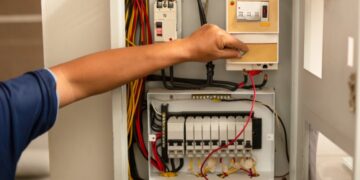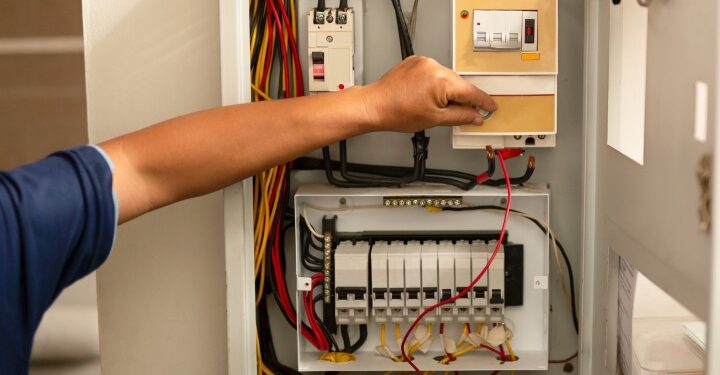Introduction
Electric panel repairs are no small matter. They’re the backbone of your home’s electrical system, ensuring safety and reliability. But how do you choose the right electrician to handle such an essential job? Finding a needle in a haystack might feel like finding a needle, but with the right guidance, you can make a confident choice. Let’s break it down step by step.
Why Electric Panel Repairs Are Crucial
Your electric panel repair is like the brain of your home’s electrical system. It distributes electricity to various circuits, ensuring your appliances and lights work without a hitch. A faulty panel can lead to power outages, increased fire risk, or damaged electronics. Choosing the right electrician ensures these risks are mitigated and your system remains safe and efficient.
Signs You Need an Electric Panel Repair
Recognizing the warning signs early can save you from bigger problems later. Here’s what to look out for:
- Frequent Circuit Breaker Trips: If your breakers trip often, it might indicate an overloaded or failing panel.
- Flickering Lights: Lights that flicker or dim without reason can signal an issue with your electrical panel.
- Burning Smell or Scorch Marks: Any signs of burning near your panel need immediate attention.
- Aging Panel: Panels older than 20-30 years might not handle modern electrical demands.
Risks of DIY Electric Panel Repairs
Attempting to fix an electric panel yourself might seem tempting, but it’s risky. Without proper training, you could:
- Cause Severe Injuries: Electric shocks can be life-threatening.
- Void Insurance Claims: Unlicensed repairs might lead to denied claims.
- Worsen the Problem: Incorrect fixes can escalate issues.
Hiring a professional ensures the job is done safely and correctly.
Qualities to Look for in an Electrician
Not all electricians are created equal. Look for someone who:
- Is Licensed and Insured: This guarantees they’re trained and covered for any mishaps.
- Has Good Communication Skills: They should explain the problem and solution clearly.
- Offers Transparent Pricing: No one likes hidden costs.
Understanding Electrician Certifications
Different certifications indicate varying levels of expertise. Here are the key ones to know:
- Journeyman Electrician: Basic qualification to handle most repairs.
- Master Electrician: Advanced skills and often supervisory roles.
- Specialized Certifications: For specific areas like industrial systems or solar panels.
Requesting and Comparing Quotes
Price matters, but it shouldn’t be the only factor. Here’s how to compare quotes effectively:
- Detail-Oriented Estimates: Ensure they include labor, materials, and any extra fees.
- Compare Apples to Apples: Make sure you’re comparing similar scopes of work.
- Don’t Always Choose the Cheapest: Sometimes, higher costs mean better quality.
Checking Licensing and Insurance
Always verify the electrician’s credentials. Here’s why:
- Licensing Ensures Training: A licensed electrician has the necessary skills.
- Insurance Protects You: It covers damages or injuries during the job.
Evaluating Experience with Electric Panels
Experience matters, especially for complex repairs. Ask about:
- Years in the Field: More years often mean greater expertise.
- Similar Projects: Have they worked on panels like yours?
Prioritizing Safety Standards
Safety should never be compromised. A good electrician will:
- Follow Local Codes: Ensuring compliance with regulations.
- Use Quality Materials: Cheap parts can lead to future problems.
- Test Thoroughly: Before declaring the job complete.
The Importance of Timely Repairs
Delaying electric panel repairs can worsen the issue. Here’s why:
- Prevent Bigger Problems: Small faults can snowball into major issues.
- Maintain Home Safety: Faulty panels are a fire hazard.
- Avoid Higher Costs: Fixing minor issues is usually cheaper than replacing the whole panel.
What to Expect During a Repair Visit
Knowing what’s involved can ease your mind:
- Initial Inspection: The electrician will diagnose the problem.
- Detailed Explanation: They’ll explain the issue and solution.
- Efficient Repairs: Most fixes can be completed within a day.
Maintenance Tips After Repairs
Keep your panel in top shape with these tips:
- Regular Inspections: Have a pro check your system annually.
- Avoid Overloading Circuits: Spread out electrical usage.
- Update Wiring When Needed: Older homes may need upgrades.
When to Consider a Panel Upgrade
Sometimes repairs aren’t enough. Consider an upgrade if:
- Your Home Is Over 30 Years Old: Modern appliances demand more power.
- You’re Renovating: Increased usage requires a stronger panel.
- Frequent Repairs Are Needed: Upgrades can be more cost-effective.
Conclusion
Choosing the right electrician for electrical repairs doesn’t have to be daunting. Knowing what to look for and asking the right questions ensures your home’s electrical system remains safe and efficient. Don’t wait until it’s too late—prioritize your electric panel’s health today.
FAQs
1. How long does an electric panel repair take?
Most repairs are completed within a few hours, but complex issues might take a full day.
2. Can I replace a circuit breaker myself?
It’s safer to let a licensed electrician handle it to avoid risks.
3. How often should I inspect my electric panel?
Annual inspections are recommended, especially in older homes.
4. What’s the difference between a repair and an upgrade?
Repairs fix specific issues, while upgrades increase the panel’s capacity or replace outdated components.





















































